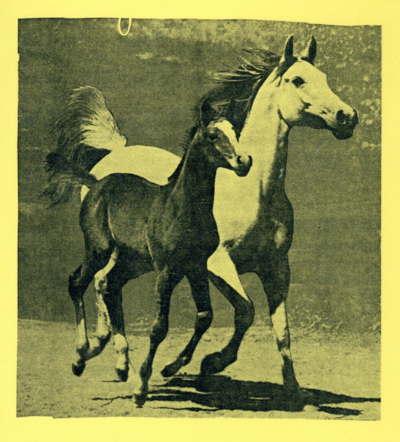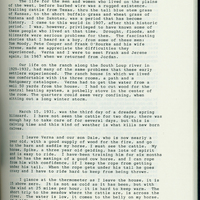077
Item
-
Title
-
077
-
Transcription
-
DRY PANTS
The life for the men and women who lived on the plains of the west, before barbed wire was a rugged existence. Trailing cattle from Texas, thru the tall blue stem grass of Kansas, to the short buffalo grass and wheat grass of Montana and the Dakotas, was a period that has become history. I came to this world in 1907, after this historic period. I was, however, privileged to have known some of these people who lived at that time. Drought, floods, and blizzards were serious problems for them. The fascinating stories that I heard as a boy, from some of these men: Tom Moody, Pete Cooper and Frank O'Rourke and his wife Jerene, made me appreciate the difficulties they experienced. Verna and I were to meet Frank and Jerene again, in 1967 when we returned from Jordan.
Our life on the ranch along the South Loup river in 1929-1932, had many of the same problems that these early settlers experienced. The ranch house in which we lived was comfortable with its three rooms, a path and a Montgomery catalogue. Verna had to get the water from a well 50 yards from the house. I had to cut wood for the central heating system, a potbelly stove in the center of the room. The quarters could seem very confining, when sitting out a long winter storm.
March 15, 1931, was the third day of a dreaded spring blizzard. I have not seen the cattle for two days, there was enough hay to take care of for several days, but this is calving time and this kind of weather is what kills new born calves.
I leave Verna and our son Dale, who is now nearly a year old, with a good supply of wood for the fire, and go to the barn and saddle my horse, I must see the cattle. My horse, Spike, a three year old gelding, has lots of spirit and is easy to ride. I have been training him for six months and he has the makings of a good cow horse, and I can rope from him with confidence, if I keep the rope from getting under his tail. When the rope gets under his tail he goes crazy and I have to ride hard to keep from being thrown.
I glance at the thermometer as I leave the house, it is 15 above zero. It is not as cold as it has been, but with the wind at 25 miles per hour, it is hard to keep warm. The short trip to the meadow where the cattle are, is across the river. The water is low, it comes to the belly on my horse. If I lift my feet, they will stay dry.
-
Rights
-
To inquire about usage, please contact Archives & Special Collections, University of Nebraska-Lincoln Libraries. These images are for educational use only. Not all images are available for publication.
 Metzger Memories
Metzger Memories
 Metzger Memories
Metzger Memories
